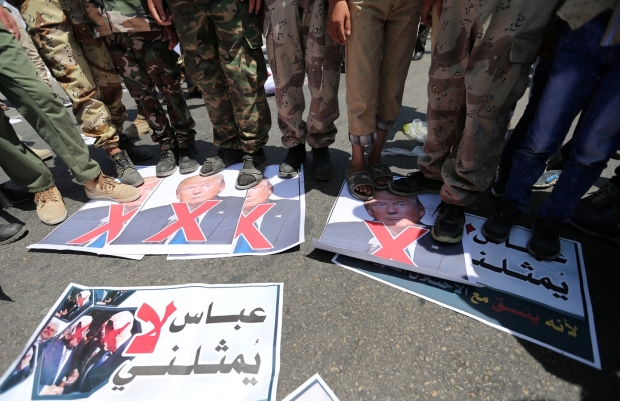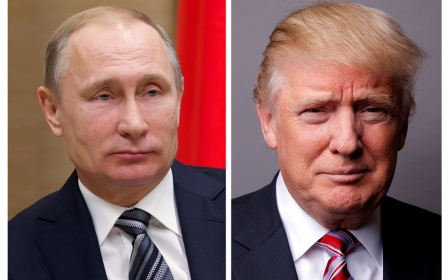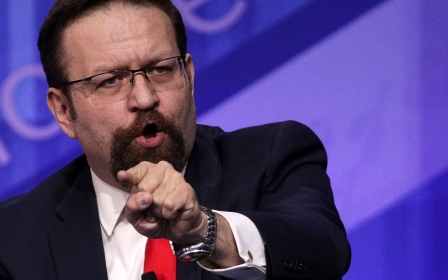ANALYSIS: Trump looks to deal, but Abbas holds weak Palestinian hand

NEW YORK, United States – Palestinians seeking their own independent state are used to setbacks. Even so, experts told Middle East Eye they should have low hopes for the first talks between their leader, Mahmoud Abbas, and his American counterpart Donald Trump on Wednesday.
The 82-year-old president of the Palestinian Authority (PA) will enter the White House with a weak hand to play. Abbas has not won an election since 2005, while his rivals, Hamas, are ditching some hard-line positions in a grab for the political middle ground.
In Trump, he faces a leader who – although unpredictable – has questioned the viability of a Palestinian state, appointed a broadly pro-Israel team and is mulling whether to bolster Israeli claims by shifting the United States embassy from Tel Aviv to Jerusalem later this month.
"It's an unenviable and very tenuous position," Josh Ruebner, an analyst for the US Campaign for Palestinian Rights, told Middle East Eye.
"Abbas faces pressures not only from the US, Israel and Hamas, but also growing legitimacy problems among Palestinians who are weary of his continued role as a president whose term expired many years ago."
Topping Abbas' fears are reports that Trump will visit Israel later this month and declare US recognition of the entire city of Jerusalem as Israel's capital, a U-turn on longstanding US policy that would doubtless draw international ire.
Jerusalem
Trump, a Republican, has dodged questions on this point. When questioned by Reuters journalists about the mooted embassy relocation on 20 April, he responded: "Ask me in a month on that."
According to Grant Rumley, an analyst with the Foundation for Defence of Democracies, a right-wing think tank, Abbas will seek to dissuade Trump from a move that could start a "third intifada" of mayhem in Jerusalem.
"At the very least, the likeliest response to a move is reigniting the lone-wolf intifada that we've seen," Rumley told MEE.
If Trump ties an Israel visit to his 25 May Brussels trip, it would be around the time Israelis mark the 50th anniversary of capturing Arab East Jerusalem in the 1967 Middle East war.
Washington and the international community do not recognise Israel's annexation of the eastern part of the city. Disagreements over the status of the city have been a major hurdle in previous rounds of negotiations.
Israel claims all of Jerusalem, which contains the Dome of the Rock and Al-Aqsa Mosque among other Jewish, Muslim and Christian holy sites, as its capital. Palestinians want East Jerusalem as the capital of their future state.
Amir Tibon, who co-authored The Last Palestinian, a book about Abbas, said Trump already missed his "easiest" chance to announce a divisive relocation on his inauguration day in January. Since then, the "reasons against doing it piled up".
"But we're looking at the unexpected presidency here. Nobody can say for sure that it's not going to happen," Tibon added.
Side-lining Palestinians
Trump has set a more positive tone with Israel than his Democratic predecessor, Barack Obama, who often clashed with Israeli Prime Minister Benjamin Netanyahu. Some Palestinians worry they will be side-lined.
The appointment of David Friedman, a backer of Israeli settlements, as US ambassador to Israel, together with Jason Greenblatt and his son-in-law Jared Kushner as White House policy advisors, has been viewed as tilting the administration in Israel's favour.
The billionaire tycoon turned president has asked Israel to limit Jewish settlement-construction on Palestinian land, and has promised to seek a Middle East peace deal that eluded his predecessors. However, he has offered no new diplomatic ideas.
"There is no reason there's not peace between Israel and the Palestinians – none whatsoever," Trump said.
For Tibon, both Israeli and Palestinian politicians were surprised that the Middle East peace process is "on the president's agenda".
Trump's "personal obsession" with landing the elusive deal may gain Abbas some leverage, he said.
But Trump can make requests of his own. Such demands may include stopping payments to families of Palestinian militants imprisoned by Israel, a policy heavily criticised by Netanyahu as encouraging further violence.
US lawmakers have also condemned the stipends to the families of Palestinian militants and Republican Senator Lindsey Graham reintroduced a bill in March that would cut US funding to the PA as a result of such payments.
Abbas concerned
Trump's fickleness is far from Abbas's only concern, with polls suggesting most Palestinians want him to resign. His term was meant to expire in 2009, but he has remained in office with no elections held.
Meanwhile, the bitter split between Abbas's Fatah party, based in the West Bank, and Hamas, the Islamist group that has run the Gaza Strip since 2007, shifted this week and may pose new issues for the PA leader.
'The Palestinians have to unify before they go running off to Washington or Tehran or wherever it is they run off to'
- Rashid Khalidi, Columbia University scholar
In a policy document presented in Doha by its leader Khaled Meshaal, Hamas dropped its longstanding call for Israel's destruction, said it would end its ties with the Muslim Brotherhood and agreed to a transitional Palestinian state within the borders of 1967.
Though Israel and others questioned Hamas' sincerity, the stated shift is viewed as a bid to ingratiate the Islamists with European donors, Egypt and Gulf Arab states as well as Fatah-backing Palestinian moderates.
For Rashid Khalidi, a Columbia University scholar, divisions among Palestinians will scupper their chances once again.
"The Palestinians have to unify before they go running off to Washington or Tehran or wherever it is they run off to," Khalidi told MEE.
"Abbas is pursuing a will-o'-the-wisp. He would serve his people better by going back home, trying to strengthen resistance to occupation and devising an actual strategy instead of wasting his people's energy and money and wasting his time in Washington."
New MEE newsletter: Jerusalem Dispatch
Sign up to get the latest insights and analysis on Israel-Palestine, alongside Turkey Unpacked and other MEE newsletters
Middle East Eye delivers independent and unrivalled coverage and analysis of the Middle East, North Africa and beyond. To learn more about republishing this content and the associated fees, please fill out this form. More about MEE can be found here.





